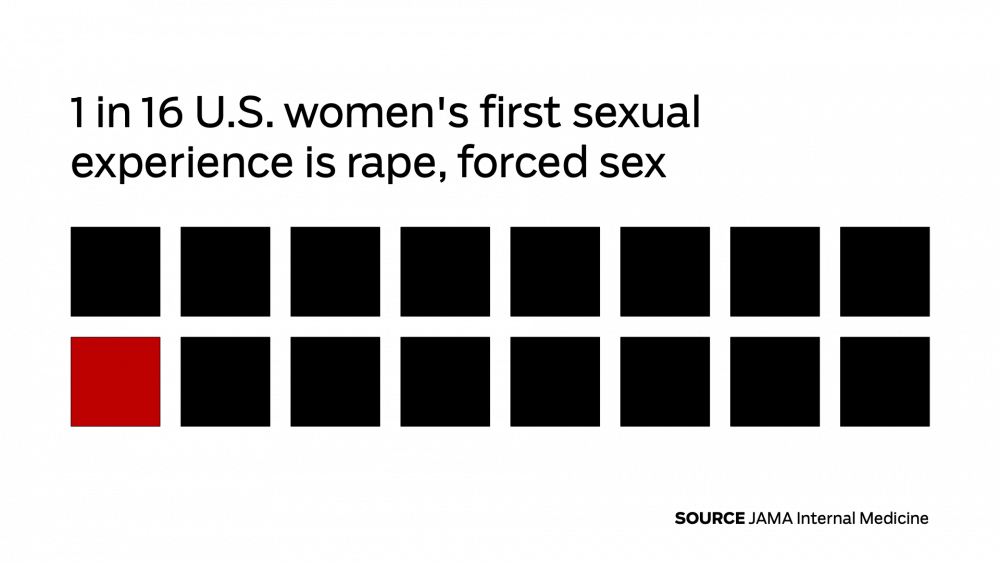By Rita Giordano
The Philadelphia Inquirer
A disturbing new study based on federal data estimates that the first sexual intercourse experience for one in 16 American women was the result of physical force or coercion.
Even in the age of #MeToo and #TimesUp, some of the findings are shocking: The average age of these survivors was 15.5 years old, while the median age of the men who forced these encounters was 27 years old, according to the findings published Monday in the journal JAMA Internal Medicine.
"This is an issue that needs to be urgently addressed because every week, thousands of women are experiencing rape as a sexual initiation," said study co-author Laura Hawks, a physician and research fellow at Harvard Medical School and the Cambridge Health Alliance.
"When we talk about sexual violence, what we're really talking about is power imbalance between women and men," she said. "We're learning more and more how insidious that inequality is in our society."
Hawks and her fellow researchers, affiliated with the Cambridge Health Alliance, Harvard and Hunter College, based their study on data from over 13,300 women between the ages of 18 and 44. The data, which included personal interviews, came from the 2011-2017 National Survey of Family Growth, a nationally representative survey conducted by the federal Centers for Disease Control and Prevention.
The new analysis showed that 6.5% of the survey respondents — or the equivalent of more than 3.3 million women — said their first sexual intercourse experience was forced, according to the researchers.
"A large number of these women were raped," said Hawks.
The types of coercion the survey participants said they were subjected to overlapped in many cases.
Overall, 46% of the women said they were physically held down, nearly 27% said they were threatened physically and over 25% said they were actually physically harmed. Half of the women said the men involved were older or larger than them. Over 56% said they were verbally pressured, and 22% said they had been given a drug.
The authors found numerous differences between the women who said their first sexual experience was voluntary and those who were forced or coerced.
The average age when the first experience was voluntary was 17.5 years old and the median age of the male partner was 21, much closer in age than the forced liaisons.
Women who reported forced sexual initiation were also more likely to have experienced negative outcomes later in life.
The women who said they were forced to have sexual intercourse were more likely to have experienced an unwanted pregnancy than women whose first experience was voluntary. The women whose first experience had been forced also were more likely to have had an abortion in their lifetime, to have never used birth control, to have engaged in illicit drug use and to have difficulty completing tasks outside of their home. They also were more apt to describe their overall health as fair or poor.
The researchers also found the women whose first experience was forced were likely to have gynecological health issues later in life, including pelvic inflammatory disease, endometriosis and problems with menstruation or ovulation.
While this new study does not include data on the types of psychological impacts on the women who endured forced first sexual intercourse, sexual violence and victimization often result in serious harm to mental and emotional health. The effects can vary even greater when the survivor is a vulnerable, impressionable child.
"Fifteen to 25% of women who are sexually assaulted will have post traumatic stress disorder symptoms severe enough to interfere with their lives," said Edna B. Foa, a professor of clinical psychology in psychiatry with Penn's Perelman School of Medicine and director of the Center for the Treatment and Study of Anxiety, who was not involved with the study.
Through Foa's own research, she said almost all the women she has worked with who were raped or sexually assaulted had some elements of PTSD immediately after the assault, and about 30% still were experiencing PTSD symptoms a year later.
PTSD's many symptoms can include flashbacks of the assault, nightmares, trouble sleeping or concentrating, being easily startled or frightened, overwhelming guilt or shame, difficulty maintaining close relationships, hopelessness and avoiding places, activities or people that bring back memories of the traumatic event.
Hawks said she hopes the findings in her study will be helpful to health care providers.
"All practitioners who are caring for women should be aware that this form of violence early in life can be an extremely traumatic event that can have lifelong consequences," she said.
Parents, educators and others involved with children should teach them about issues like consent and also equality, she said.
"We're learning more and more how insidious that inequality is in our society," Hawks said. "We need to take a look at how we approach inequality in all its spheres."




